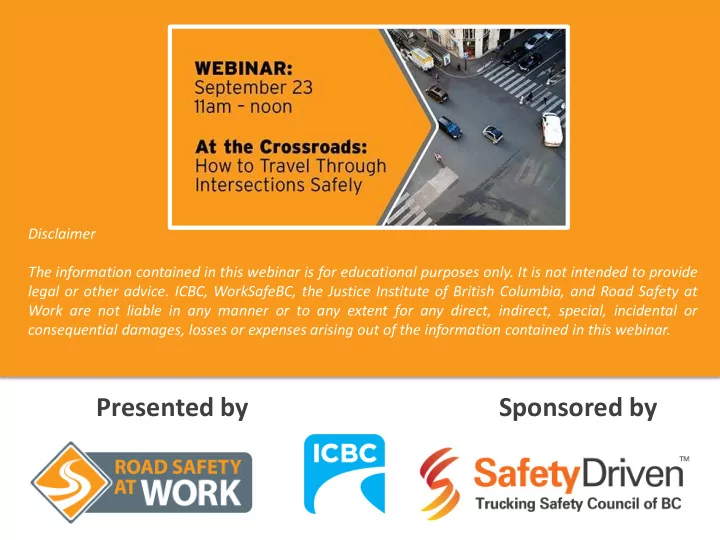

Disclaimer The information contained in this webinar is for educational purposes only. It is not intended to provide legal or other advice. ICBC, WorkSafeBC, the Justice Institute of British Columbia, and Road Safety at Work are not liable in any manner or to any extent for any direct, indirect, special, incidental or consequential damages, losses or expenses arising out of the information contained in this webinar. Presented by Sponsored by
Presented by Sponsored by
Audio instructions Select “Computer audio” to use your computer’s sound OR Select “Phone call” to dial in 3
Asking questions Click on “Questions” to expand the Questions pane Then Type your question to the moderator
Key Sponsor / Supporter SafetyDriven.ca About SafetyDriven • Health & Safety Association for trucking and related industries • Industry led organization • Dedicated to improving safety operations and reducing workplace injuries and fatalities. What does SafetyDriven offer • Safety services • FREE online resources • Certificate of recognition (COR) • Courses and training Benefits: • Team of safety professionals • Custom safety program • Reduce costly incidents
Today’s webinar partner
Introducing today’s presenters Alex Lee ICBC Road Safety Program Manager Angelina Robinson Road Safety At Work Client Relationship Manager Rick Walters Road Safety At Work Road Safety Manager 7
Overview • The importance of intersection safety Current statistics, helpful info and tools • How employers can help prevent collisions at intersections Tools, practices, processes and resources • How drivers / employees can help reduce risks Tools, resources and practical driving tips • Questions and answers 8
Alex Lee Speaking Alex Lee ICBC Road Safety Program Manager
Quick stats - ICBC ICBC2020 10
Quick stats - ICBC 11
Intersection conflict points 32 conflict points Diagram source: US Federal Highway Administration (FHWA). 12
ICBC quick stats https://www.icbc.com/about-icbc/newsroom/pages/Statistics.aspx 13
ICBC quick stats 14
ICBC quick stats 15
ICBC reported crashes 16
ICBC reported crashes 17
ICBC regional crash maps 18
ICBC regional crash maps 19
ICBC intersection safety camera map https://www.icbc.com/road-safety/community/Pages/intersection-safety- camera-program.aspx 20
ICBC intersection safety camera map 21
ICBC intersection safety camera map 22
Questions
Things employers can do About 60% of crashes happen at intersections • Locations with increased risk of harm • But, opportunity to reduce risks 1. Manage journeys, plan trips 2. Optimize driving workspace 3. Collaborate to find solutions 24
Reduce driving to reduce risk Journey Management Tool Kit 25
Plan routes to avoid high-risk intersections • Use ICBC crash maps information • Identify routes that avoid intersections that have a high crash frequency 26
Plan safe routes 27
Plan safe routes 28
Plan safe routes 29
Help employees plan safer trips Build trip plans with realistic travel times and clear directions . 30
Help employees plan safer trips • Adjust schedules to avoid peak traffic • Avoid congested routes and road work • Check websites for road work and closures 31
Talk about intersection safety • Talk about “preferred practices” • Communicate and monitor changes • Download the Tailgate Meeting Guide: Intersection Safety 32
Things drivers can do • Before they’re behind the wheel • When they’re on the road • At the intersection 33
Critical reasons National Highway Traffic Safety Administration (2010) • Significant number of crashes are at intersections • 800,000 intersection-related crashes: 96% driver reasons Less than 3% vehicle or environment reasons 34
More critical reasons The most frequent critical reasons were: 1. Inadequate surveillance (44.1%) 2. False assumption of other’s action (8.4%) 3. Obstructed view (7.8%) 4. Illegal maneuver (6.8%) 5. Distractions inside vehicle (5.7%) 6. Misjudgment of gap or other’s speed (5.5%) 35
Before you get behind the wheel Journey management • Know where you’re going • Avoid risky intersections • Set realistic travel times Driver • Be fit for duty 36
Before you get behind the wheel Know the rules of the road Drive Smart Manual Online practice test 37
Optimize driving workspaces • Set the driver’s position for the best view • Adjust the seat • Set the mirrors • Adjust head restraint • Adjust the seatbelt 38
Optimize driving workspaces • Clean the windows inside and out • Keep vehicles clutter- free and distraction-free 39
Optimize driving workspaces Visit: Optimize Your Driving Workspace Tool Kit 40
On the road • Watch your speed • Check your lane position • Be aware • Watch for signs and traffic lights • Make mental notes and estimates 41
On the road - Driving around trucks Be Truck Aware 42
On the road • Look 1.5 to 2 blocks ahead • Scan left and right of your travel path • Check your rear-view mirrors • Repeat Watch for Dangers Future dangers Changes 43
On the road – looking and seeing 90% of what we think we see is our brains filling in the blanks • Bias • Memory • Past experiences 44
At an intersection Making turns Waiting Avoid distraction 45
Summary • The importance of intersection safety Current statistics, helpful info and tools • How employers can help prevent collisions at intersections Tools, practices, processes and resources • How drivers / employees can help reduce risks Tools, resources and practical driving tips 46
Questions
Contact us with your questions angelina.robinson@roadsafetyatwork.ca rick.walters@roadsafetyatwork.ca
Visit our websites for more tools and resources https://roadsafetyatwork.ca
Register now for our Next Webinar Shift into Winter: Practical BC Winter Driving Tips November 4, 2020 11 am - noon Click to register
Thank You! Follow Us On
Recommend
More recommend